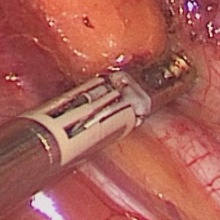In its latest Research Training Group (GRK) funding round, the German Research Foundation (DFG) has approved a further Research Training Group at the University of Stuttgart. The GRK will perform research in the field of medical technology to develop innovative sensor systems for "Intraoperative Multisensory Tissue Differentiation in Oncology". These will enable cancer surgeons to differentiate at high resolution between malignant and healthy tissue during surgery, enabling them to better determine if tissue needs to be removed or preserved. In the long term, the aim of the GRK is to employ real-time data to improve patient safety and to shorten lengthy operations.
The Research Training Group will be a collaboration between the University of Stuttgart and the University of Tübingen. The group's spokesman is Prof. Oliver Sawodny from the Institute for System Dynamics at the University of Stuttgart.
Precise tumor removal requires simpler and faster differentiation between malignant and healthy tissues
The overriding goal of novel interventional surgical procedures is to combine minimal invasiveness and high effectiveness with short treatment times and low complication rates. The ability to differentiate between malignant target structures (malignant tumors) and surrounding tissue during surgery is crucial in oncology. At present, the gold standard for intraoperative tissue differentiation is histopathological frozen section analysis. Pathologists analyze samples outside the operating theater, which prolongs operations and may lead to information being lost. Frozen sections also cannot provide comprehensive information on whether a tumor is heterogeneous or complex.
The new Research Training Group will be developing intraoperative real-time sensor systems to help surgeons decide whether to resect (remove) or preserve tissue. Precise tumor removal is the goal.
The group will be a collaboration between universities and will focus on "sensor development", " modeling and classification" and "surgery and pathology." Researchers in the group from the University of Stuttgart will focus on sensor development, modeling and classification.
"Sensor development" research focus
During minimally invasive surgery, malignant tissue cannot be characterized with sufficient accuracy using a single sensor. The Research Training Group was founded to precisely identify changes in the physical properties (mechanical, optical, electrical) of the target tissue. This should help surgeons to decide in real time between tissue preservation and tumor resection. Various institutes at the University of Stuttgart are developing, extending and improving novel sensor techniques:
- Discrimination of deeper tissue layers using model-based optical sensor technology (Institute for Technical Optics, Prof. Alois Herkommer)
- Discrimination between tissues using infrared spectroscopy (Institute for Technical Optics, Prof. Alois Herkommer)
- Tissue discrimination by means of electrical impedance spectroscopy (Institute for System Dynamics, Prof. Oliver Sawodny).
"Modeling and classification" research focus
Meaningfully combining data gathered by multisensory techniques to classify samples will require solutions to a number of underlying technical problems. Where were measurements taken? What was the surrounding anatomy at the tumor site? How can the data collected be merged and classified? How can the system learn as more patients are treated?
- Intraoperative navigation & multiphysical tissue modeling (Institute for System Dynamics, Prof. Oliver Sawodny)
- Multimodal sensor fusion (Institute for System Dynamics, Prof. Cristina Tarín)
Research Training Groups
Research Training Groups have the goal of supporting young researchers. They offer doctoral students the opportunity to complete their doctorate at a high professional standard and benefit from a structured research and qualification program. The German Research Foundation (DFG) has recently granted awards for 16 GRKs. Commencing in 2020, these will initially be funded for four and a half years with a total of around 72 million euros.
Expert Contact:
Prof. Oliver Sawodny, Institute for System Dynamics, Tel. +49 711 685-66302, E-Mail


